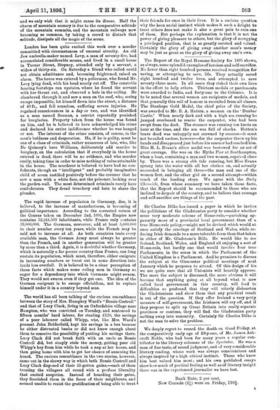The world has all been talking of the curious resemblance
between the story of Mrs. Humphry Ward's "Bessie Costrell" and that of Lucy Clack, living in an Oxfordshire village near Bampton, who was convicted on Tuesday, and sentenced to fifteen months' hard labour, for stealing 2120, the savings of a poor labourer called Whipp, who, like Mrs. Ward's peasant John Bolderfield, kept his savings in a box because he either distrusted banks or did not know enough about them to conceive the possibility of putting his savings there. Lucy Clack did not break faith with an uncle as Bessie Costrell did, but simply stole the money, getting poor old Whipp's key from him while he took a nap at her house, and then going home with him to get her chance of annexing the hoard. The curious resemblance in the two stories, however, came out in the showy way in which both Bessie Costrell and Lucy Clack disposed of their ill-gotten gains,--each of them treating the villagers all round with a profuse liberality that excited suspicion. Instead of hoarding their gains, they flourished them in the faces of their neighbours, and seemed unable to resist the gratification of being able to treat
their friends for once in their lives. It is a curious question why the keen soaial instinct which makes it such a delight to treat others does not make it also a great pain to ruin one of them. But perhaps the explanation is that it is not the power of giving pleasure to others, but the glory of occupying a privileged position, that is so greatly coveted and valued. Certainly the glory of giving away another man's money may be just as great as tbe glory of giving away one's own.


































 Previous page
Previous page